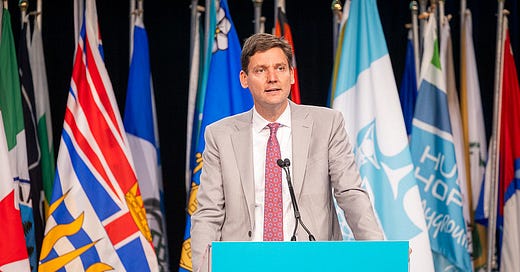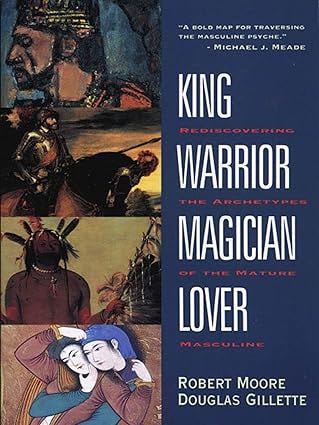The B.C. election through a Jungian lens
Political journalists don't often talk about male archetypes
Back in July of 2022, I wrote about similarities between Premier David Eby and a former B.C. NDP leader:
“Eby has a few things in common with Tom Berger, a very articulate and polished lawyer who led the party to a disastrous defeat in the 1969 election. Berger cruised to victory in his party's leadership race, thanks in part to the support of organized labour, but he didn't have the mustard in blue-collar British Columbia, let alone in his own constituency of Vancouver-Burrard. Is Eby going to be Berger 2.0? That's a question that might emerge in the minds of some party elders who recall the 1969 election.”
This week, a Leger poll put the B.C. Conservatives ahead of the B.C. NDP among decided voters for the first time. It will strike some urban dwellers as inconceivable how John Rustad, a cast-off from the former B.C. Liberal caucus, could now be leading a blue wave that threatens to toss the B.C. NDP out of office.
Political pundits offer many explanations. There’s the uniting of the right, the media’s fixation with street disorder even as crime rates fall, and high housing prices. Layered onto that is the never-ending toxic-drug crisis, as well as the federal Conservative surge under Pierre Poilievre.
But still, John Rustad??? He was one of the lesser-known B.C. Liberal MLAs for 17 years. That is, until he was removed from caucus for retweeting a message calling on folks to “celebrate CO2”.
Why is the clever Eby struggling against a climate doofus from a remote area of B.C.? Moreover, a climate doofus who willingly cozies up to Jordan Peterson?
I think the answer lies more in the realm of psychology.
A political Magician
Not enough voters are warming up to Eby in the way that they did with his predecessor, John Horgan. No matter how much Eby smiles for the cameras and tries to convey how friendly he is, he doesn’t fire people up emotionally.
I’ve always thought of Eby—like many lawyers—as exuding “Magician” energy. Two Jungians, Robert Moore and Douglas Gillette, explain what this means in their 1990 book, King, Warrior, Magician, Lover: Rediscovering the Archetypes of the Mature Masculine.
In ancient cultures, they write, the Magician was often the holy man, witch doctor, or shaman.
“Whatever his title, his specialty is knowing something that others don’t know,” they declare. “He knows, for instance, the secrets of the movements of the stars, the phases of the moon, the north-south swings of the sun. He knows when to plant and when to harvest or when the herds will arrive next spring.
“He can predict the weather,” the authors continue. “He has knowledge of medicinal herbs and poisons. He understands the hidden dynamics of the human psyche, and so he can manipulate other human beings, for good or ill.”
Foreigners scapegoated
Moore and Gillette maintain that the Magician’s capacity to access secret knowledge gives him enormous power, which he’s a master of containing and channelling.
I felt that Eby’s Magician energy was on display in the period leading up to the 2017 provincial election. Eby masterfully whipped up public rage over “foreign money” driving up housing prices. It helped his party form the government and he was rewarded with the attorney general portfolio.
Eby also showed his Magician side with his crusade against money laundering. He focused on casinos, luxury vehicles, horse racing, and housing. By releasing video of people showing up at the River Rock Casino with hockey bags full of cash, Eby created a narrative that stuck in the public mind. They found their scapegoat for high housing prices and the scourge of toxic-drug deaths: foreigners, notably from the People’s Republic of China, who were exploiting loopholes in gambling regulation.
It didn’t matter that the amount of cash going through the casino was utterly dwarfed by the magnitude of residential real estate sales in Metro Vancouver.
Of course, the primary causes of high housing prices were a lack of supply due to municipal zoning, sustained low interest rates, intergenerational wealth transfers, and rising land and construction costs. Now, the B.C. NDP government is trying to address the supply problem—and I give Eby credit for that.
But the problem remains for Eby politically in 2024. How does someone who seems to be in the thrall of the male Magician archetype connect with people’s hearts during an election campaign? The answer to this question could determine his political future.
A good start might be to ignite his Warrior energy, which Horgan had in abundance. There’s a reason why many male sports fans felt comfortable with Horgan. He used to relish a good political fight.
Eby may also want to try to engage more with the Lover archetype and exude more joy. There’s a reason why men influenced by this archetype are attracted to arts and culture. They can also be remarkably perceptive.
“The man profoundly in touch with the Lover energy experiences his work, and the people on the job with him, through this aesthetic consciousness,” Moore and Gillette write. “He can ‘read’ people like a book. He is often excruciatingly sensitive to their shifts in mood and can feel their hidden motives.”
I believe that Rustad, for all of his strange ideas, is more in touch with the Lover archetype than Eby is. This might partially explain why Rustad is connecting with average folks on the campaign trail.
According to Moore and Gillette, a man under the influence of the Lover “does not want to stop at socially created boundaries”.
“He stands against the artificiality of such things,” they write. Rather, this person will confront the conventional, just as Rustad has done with his flirtation with the antivaxxers who helped build his party.
Magicians are great at using their brains to access hidden knowledge. But it’s politicians who touch people’s hearts who often come out ahead. Think of Justin Trudeau versus Stephen Harper. Or Horgan versus Andrew Wilkinson. Or Jean Chrétien versus Kim Campbell.
On occasion, a cold fish like former B.C. premier Bill Bennett or former prime minister Stephen Harper can win power. Harper secured a majority with the help of vote splitting among those who can’t stand him.
Eby, who’s also a bit of a cold fish, looked like he would cruise to victory when B.C. United was battling the B.C. Conservatives on the right. But now, it’s a whole new ballgame.
The B.C. NDP is going to great lengths to try to define Rustad as mean and cold. However, this messaging is belied by the warm reception that the B.C. Conservative leader is receiving from his admirers on the campaign trail.
Right now, Eby’s best chance to regain momentum will be in the upcoming televised leaders debate. But he faces a vexing problem in responding to Rustad, who remains reasonably popular despite an advertising onslaught against him. And for B.C. NDP campaign strategists under the influence of the Magician archetype, it will be difficult to change gears.
That’s because they’re likely to be among the last ones to appreciate the wisdom contained in Moore and Gillette’s enlightening book.




